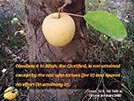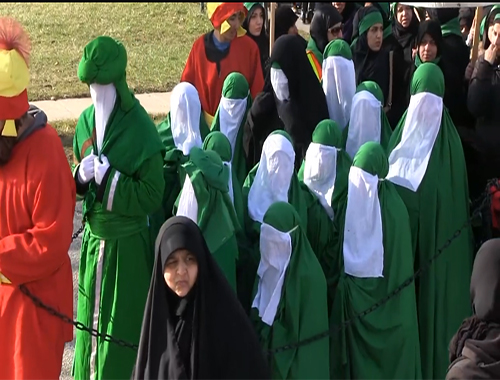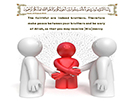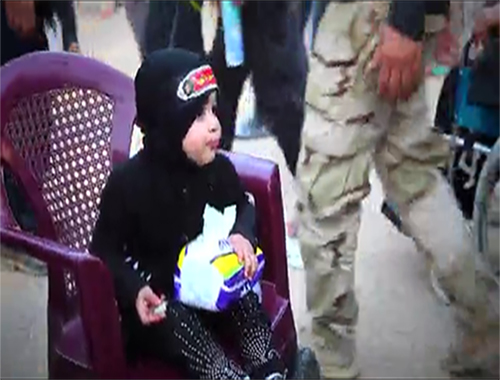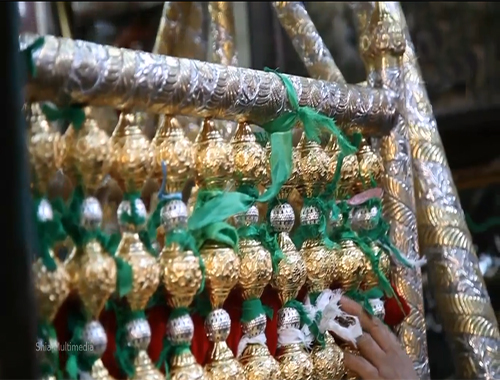A glimpse from the Ray of Imam Hussain
- Details
- Hits: 51635
Written by Sayyed Muhammad Al-Shirazi
Allah Almighty states {Think not of those who are slain in Allah's Way as dead. Nay, they live, finding their sustenance in the Presence of their Lord}[1]
This noble verse in the holy Qur’an points to the state of those who are killed in the cause of Allah, and it emphasises that their ‘life’ continues even after being killed, and that they remain alive. So he who is killed in the cause of Allah, his life would not be terminated, but he remains alive and receives sustenance (from Allah Almighty).
Also just as there are categories in this material life, those who are happy and those who are not, such classifications also exist in the hereafter too.
And how can it not be, when we have martyrs who scarified their lives to uphold the Truth and the Oneness of Allah Almighty. With their blood they have taken life out of darkness and into light, so that future generations can receive and adhere to the teaching of Islam.
And what if he who sacrificed himself – as well as being a martyr whom Allah promised eternal life – was also a pillar of faith and one of the Imams[2] of the Muslims and mankind, such as Sayyid-ul-Shuhada Imam Hussain (a). What a great martyr he is, and an esteemed station he occupies! Addressing Imam Hussain (a), his son and successor Imam Zayn al-Abidin (a) states, “and as for the Hereafter, it is luminous with the light of your face”.
The Infallible Imam
If we want to get acquainted with the great personality of an infallible Imam, it is necessary for us to refer to some of the hadith that elucidate the station of the Imam (a) in the view of Allah Almighty, as well as his creative and legislative position.
Commenting about the Qur’anic verse, {and he to whom wisdom is granted receives indeed a benefit overflowing}[3] Imam Sadiq (a) said; “(This is) obedience of Allah and gaining knowledge about the Imam”.
Also commenting about the Qur’anic verse, {Say: "See ye? If your stream be some morning lost (in the underground earth), who then can supply you with clear-flowing water?"}[4] Imam Kadhem (a) said, “If your Imam disappears from you, then who will bring you another Imam?”
In another hadith from Imam Redha (a), he said, “. . . the Imam is the trustee of Allah amongst His creation, His proof and evidence upon His servants, His viceroy on His land, the herald to Allah, the defender of the commandments of Allah . . .”
The Ma’soom Imam has been chosen by Allah Almighty to represent Him, since he has a significant position in the sight of Allah. The lofty station that the Ma’soom has attained is beyond our comprehension. Addressing the significance and superiority of the Imam, Imam Redha (a) said, “who can attain the full knowledge and understanding of the Imam, or who can choose an Imam? How impossible! The intellects went astray, the minds were confused, the eyes were blurred, the great men were belittled, the wise were bewildered, the eloquent failed to describe one aspect of his characteristics, or one virtue of his many virtues, and admitted their failure to do so, . . .”
So through these noble hadith and many more like them, it is possible for us to appreciate certain aspects of the personality and station of Imam Hussain (a), and his closeness to Allah Almighty, and his role in leading and guiding the community of mankind. Thus if we wanted to reach the divine mercy, and attain the bliss and felicity of this world and the hereafter, then we must certainly follow the foot steps of Imam Hussain (a), move according to the course he devised for future generations with his pure blood. Of course the same is true for other infallibles (a), but here we are talking about and focusing on Imam Hussain (a).
Imam Hussain (a) is distinguished amongst other martyrs and revolutionaries by characteristics that excel all other martyrs; he became the master of all martyrs – from the first to the last – and this is not because he is an infallible Imam, nor is it because he is the grandson, and the beloved one of the Messenger of Allah (s), but it is because of the majesty of the aims for which he started his revolution, the immensity of the sacrifice that he offered, and the perfection he achieved in various dimensions. This is why the particular emphasis is made by Ahl-ul-Bayt (a) on establishing and upholding the Hussaini Sha’a’er, and the salute and visitation of Imam Hussain (a).
Hadith on the Virtue of Imam Hussain (a)
There are many hadith about the station and position of Imam Hussain (a). The Messenger of Allah (s) is reported as saying, “he who want to see the one inhabitant of the Earth who is most beloved by the inhabitants of the skies, he should look at al-Hussain”.
The Messenger (s) is also reported as saying, “Truly al-Hussain is one of the gates of Paradise; he who opposes him, Allah would deny him even the scent of Paradise”.
Perhaps only this hadith is sufficient so as not mention any more hadith about the station of Imam Hussain (a).
There are many hadith narrated from the Ahl-ul-Bayt (a) with regards to establishing the Hussaini Sha’a’er. Imam Sadiq (a) is quoted as saying, “He whose eyes fill with tears when we are mentioned to him, Allah would bar his face from fire (of Hell)”. And can you imagine what would be the reward for he who weeps for Imam Hussain (a), who is Sayyid-ul-Shuhada (Master of the Martyrs) and Qateel-al-‘Abarah (the murder victim who brings tears to the eyes).
Imam Mahdi may Allah hasten his return in his salute – known as Ziyarat Nahiyah – to Imam Hussain (a) declares,
“Peace be to he in whose torbah (the soil of the burial site) Allah has made the cure (for every disease),
Peace be upon he under whose dome prayers are answered,
Peace be upon he whose descendents are the Imams, . . . ”
From the above alone, only the first statement is sufficient (his torbah being cure for every disease) to show the divine miracle in the matter, and if this proves anything it points towards the position and station of Imam Hussain (a).
The Companions of Imam Hussain (a)
One other aspect that distinguished the movement of Imam Hussain (a) amongst other movements throughout history is the distinguished virtue of his companions, who were martyred alongside him, to the extent that Imam Hussain (a) said,
“I do not know of companions and family members more faithful and devoted than my companions and family members”
One of the greatest of the martyrs of Karbala is Abul-Fadhl al-Abbas (a), the son of Imam Ali (a) and his mother is Omm-al-Baneen. Abul-Fadhl has many virtues and qualities, and has shown many miracles, which point to his station, and closeness to Allah Almighty. Imam Zayn al-Abidin (a) has said about al-Abbas (a),
“May Allah have Mercy upon my uncle Abbas ibn Ali, for he favoured his brother over himself, showed extreme courage, and sacrificed himself for his brother, such that both of his hands were cut off. Thus Allah replaced them with two wings, with which he flies with the angels in Paradise, just as He gave Ja’far ibn Abi Talib. In the Sight of Allah al-Abbas has a station and position that all martyrs would envy on the Day of Judgement.”
Furthermore, al-Abbas (a) is known as Baab-al-Hawa’edge or the “Gate of Needs” to Allah Almighty, and this in itself is a manifestation of martyrs being alive by their Lord, such that people use their Light after their martyrdom, and the people plead to them to fulfil their needs.
Day of Ashura
There are days that are turning points in the course of history and in the direction of life on Earth, and one of the most important of those days is the day of Ashura. Just as the 27th of Rajab – the day of Mab’ath or First Revelation to Prophet Muhammad – forever changed the course of history and life on Earth, and just as the Messenger of Allah (s) planted the seeds of Islam and Iman in the hearts of the people, the day of Ashura and the sacrifice of Imam Hussain (a) returned Faith or Iman to the hearts of the people and restored the image of Islam which the evil hands tried to distort and destroy.
When the pagans of Quraysh asked the Messenger of Allah (s) to forego his mission and his call for the oneness of Allah in exchange for all that wished for in terms of wealth and position, the Messenger of Allah (s) replied, “by Allah if they were to put the sun in my right hand and the moon in my left, for relinquishing this cause, before Allah establishes it or I die, I would not abandon it”. Just as the Messenger of Allah (s) showed his resolve and steadfastness in his mission, Imam Hussain (a) manifested his resolve on a number of occasions in Karbala, which would never be forgotten by the passage of time. For example at noontime on the day of Ashura, one of the companions said it is prayer time as it is now noontime, Imam Hussain (a) said, “Yes it is”, and he led the noon prayers, despite the raging battle and the ferocity of his enemies. Thus at the most pressing and dangerous times Imam Hussain (a) did not relinquish even one of the obligations of Allah Almighty, and he took this stance to emphasise the importance of protecting the sanctity of the divine obligations, establish and uphold the Islam and its laws and teachings. In the Zeyarat (Salutation) of Imam Hussain (a) it is stated, “I hereby testify that you upheld the prayers, paid the Zakat, enjoined on good, and forbid evil”. The day of Ashura is the day that teaches us how to straighten and perfect our way of life in this world, and how to match it to the Seerah or the way of life of Imam Hussain (a), who sacrificed everything he had for the sake of Enjoining Good, Forbidding Evil, and upholding the duties of Islam, implementing its teachings, and adhering to Ahl-ul-Bayt (a).
Hussain: Torch of Guidance and Ark of Salvation
It is reported that on one occasion Imam Hussain (a) entered into a room where Prophet Muhammad (s) was present, and the latter welcome him by saying, "Welcome to you O Aba-Abdillah, the beauty of the heavens and earths". It was said to the Prophet, "How can anyone other than you be the beauty of the heavens and earths?" The Messenger of Allah (s) replied, "by He who sent me as a messenger, al-Hussain is greater in the heavens than he is on earths. And it is written on the right of the Arsh “Throne”[5] that, "al-Hussain is Torch of Guidance and Ark of Salvation", and then the Messenger of Allah (s) took the hand of Imam Hussain (a) and said, "O people! This is Hussain son of Ali, so glorify him and favour him (over others) Just as Allah has favoured him, for by He in whose hand is my soul, his place is in the heavens, and the place of those who love him is also in heaven, and the place of those who love them is also in heaven."
Imam Sadiq, (a) said, "My (grand) father is Qateel-al-‘Abarah (the murder victim who brings tears to the eyes). The Imam was asked what is Qateel-al-‘Abarah? The Imam replied, “He (Imam Hussain) is not mentioned to a believer, unless he weeps for him."
The Choice of Allah
Imam Hussain used to say, "I want to enjoin good, and forbid evil, follow the teachings of my grandfather (Rasulollah) and that of my father Ali ibn Abi Talib, . . .". He wanted to take the Ummah from Evil to Good, and put a stop to Evil, he wanted to rescue the Ummah from the low and miserable state they had settled in to honour and glory, and this after the Muslim Ummah had accepted this deteriorated condition, symbolised by its state of apathy, reliance on worldly matters, its silence to oppression, and therefore the domination of tyrants such as Yazid and his father and their likes over the realm of the Ummah. Imam Hussain (a) wanted to spread and disseminate the spirit of Iman - commitment and conviction - and Truth in amongst the Ummah so that it could awaken once again; just as it was in the days of the Messenger of Allah (s). For it was clear to him that the religion (of Islam) was being distorted and deviated and he wanted to restore it afresh.
This is how Imam Hussain (a) became the Torch of guidance, and Ark of salvation, and this is how he became the Choice of Allah Almighty. It is reported from Imam Ali (a) that the Messenger of Allah (s) said, “when I entered paradise[6], I saw written on its door with gold, there is no god but Allah, Muhammad is the Beloved One of Allah, Ali is Waliy-ullah, Fatima is Amatullah, Hassan and Hussain are the Choice of Allah, and upon he who hates them be the Curse of Allah.”
Adherence to the Choice of Allah, and using the light of this Divine Torch, will bring guidance in this world and salvation in the hereafter. This is because the love of Imam Hussain (a) is associated with good deeds, he is a torch who shows the path of the Truth to those who seek it, and since by his sacred movement he – (a) – discriminates between the path of Truth and the path of Falsehood. In his well-known declaration on the day of Ashura, he states,
“If the religion of Muhammad were not stand unless by my killing, O swords! So take me”.
Furthermore, Imam Hussain (a) also is the fifth member of As-hab al-Kissa, about whom the Purification verse was revealed; in the statement of the Almighty:
{Allah only wishes to remove all abomination from you, Ahl-ul-Bayt (Members of the Household), and to make you pure and spotless.}[7]
So by the evidence of the Qur’an, he is from the Ahl-ul-Bayt (a). The Messenger of Allah (s), “To love me and my Ahl-ul-Bayt is valuable and beneficial on seven occasions: whose fears are immense; at the time of death, in the grave, at the time of resurrection, at the (time of evaluating one’s) Book of Deeds, at the time of questioning, and at the time of weighing (one’s deeds of good verses evil)”.
Truly Imam Hussain (a) is a Torch of guidance, and his light continues to shine upon us with goodness and blessing; for it distinguishes the path of the Truth from Falsehood at all times and ages, this is in addition to the perpetual presence of his light in his Ma’soom descendent – in the manifestation of his grandson Imam Mahdi may Allah hasten his reappearance. In acknowledging the momentous sacrifice Imam Hussain (a) made, and the colossal trial and tribulation he faced on the day of Ashura, Allah Almighty fashioned the Imams – who are the protectors of Islam – in amongst his descendents.
Head of Imam Hussain (a)
One of the miracles that Allah Almighty gave to Imam Hussain (a) was that his sacred head spoke as it was being carried from Karbala – in Iraq – to Shaam – modern Syria – and back to Karbala where it was buried in the grave where his sacred body had been buried. In the course of the entire passage of the women and children captives, with which the heads of the martyrs of Karbala were also carried from Karbala to Shaam and back, the sacred head of Imam Hussain (a) used to recite the holy Qur’an, and this phenomenon proved instrumental in guiding the people to Truth. The sacred head of Imam Hussain (a) also spoke in the court of the evil Yazid. When the sacred head of Imam Hussain (a) arrived at the court of Yazid, amongst others, the Roman envoy of the emperor of Rome was also present. After realising that the captives were the women and children of the household of the Prophet of Islam, and the head of the grandson of the Prophet was amongst them, the Roman envoy protested to and rebuked Yazid, and said, “had we had a descendent of Jesus amongst us we would have honour him and glorify him”. In response to this protest Yazid ordered the Roman envoy to be killed immediately. The sacred head of Imam Hussain (a) said in a loud voice, “there is no power but that of Allah”. At that occasion and at every other occasion throughout the journey from Karbala to Shaam and back, people were astonished to see and hear the sacred head of Imam Hussain speaking, and they realised that this was no ordinary event but a divine miracle, and Allah Almighty is showing them the realty of Imam Hussain (a). Such events revealed to the people the reality and the significance of the hadith stated by the Messenger of Allah (s), “I leave behind two momentous weights, the Book of Allah and my descendents the Ahl-ul-Bayt”the people realised that the truth is with Imam Hussain (a) when they saw the miracle of his sacred head speaking or reciting the holy Qur’an.
Conveying the Voice of Imam Hussain (a) to the World
There are therefore certain duties that we must discharge with respect to the movement of Imam Hussain (a), some of which are:
1. We must present the movement of Imam Hussain (a), as well as his principles and aims to the world through modern media such as Radio and Television, books, internet, etc. in the way that Imam Hussain (a) would want it. We must glorify the Sha’a’er which the Hussainiyahs facilitate commemorating the martyrdom of Imam Hussain (a). It is also desirable that the days of Ashura are declared public holidays and signs of sadness and mourning being publicly displayed. Imam Redha (a) said, “even the Jahiliyyah – the pre-Islamic era – used to regard Muharram as a scared month, thereby forbade war and fighting in it, whereas our sanctity was violated in this month! Our blood was shed, our dignity breached, our women and children were taken prisoners, our tents were torched; and all their contents looted, our dignity were not saved even for the sake of (our grandfather) the Messenger of Allah (s) . . . , truly the day of Hussain wounded our eyelids[8], shed our tears, humiliated our revered in the land of Karb (anguish) and Bala’ (affliction), and you (O land) have left us with anguish and affliction until the last day of this life. So for the likes of Hussain the weepers should weep, for crying and weeping destroys the great sins”. Then Imam Redha (a) said, “With the start of the month of Muharram, my father could not be seen smiling, every day his heartache and anguish would increase until the tenth day, which was the day of sorrow, grief and weeping; saying this is the day al-Hussain (a) was killed”. Imam Redha (a) is also reported as saying, “he who does not concern himself with his business and occupation, or seek to sort out his affairs on the day of Ashura, Allah Almighty would see to his needs in this world and in the hereafter, and he for whom the day of Ashura is the day of mourning and sorrow, Allah would make the Day of Judgement the day of joy and happiness, and he would be pleased seeing us in Paradise. He who considers the day of Ashura the day of barakah - blessing and good fortune – and stores food stuff etc. in his house, on the day of judgement Allah would resurrect him and accommodate him at the bottom of hell with Yazid, Obaydullah ibn Zeyad, and Ommar ibn Sa’d – may the curse of Allah be upon them”.
2. Just as Imam Hussain (a) strived to implement the teachings of Islam and the laws of the holy Qur’an, so too we must follow in his footsteps and implement the teachings and laws of Islam throughout the Muslim land.
3. It is imperative upon us, wherever we may be, to hold programs for Imam Hussain (a), in the best possible manner, since the survival of Islam until the end of time is the aim which Imam Hussain (a) died for. Islam shall remain alive by virtue of the blood of Imam Hussain (a) and the blood of those were brought up in his school, defending Islamic values and teachings, throughout history.
In short, commemorating the memory of Imam Hussain (a) by holding mourning programs of Ta’ziah in the days of Ashura, giving food on those days, etc. all of such programs help keep the memory of Imam Hussain (a) alive, and it is such programs that have protected the spirit of Shi’a and adherence to the holy Qur’an and the Ahl-ul-Bayt alayhum-as-salam.
Imam Zayn al-Abidin (a) and Ashura
Imam Zayn al-Abidin (a) also manifested the essence of this duty by his prolonged grief and weeping for his father. It is reported from Imam Baqir (a), “ . . . and he (Imam Zayn al-Abidin) wept for his father for twenty years, and every time he was served food and drink, he wept for Imam Hussain (a), until on one occasion his servant said to him, "Is your sorrow and grief not going to end?", Imam Zayn al-Abidin, (a) replied, "Woe unto you! The prophet Jacob had twelve sons, and (when) Allah made one of them disappear, his eyes turned white (i.e. blind) because of his increasing crying for him, his head turned grey because of grief, and his back humped because of sorrow, and all this while his son was alive in the world. Whereas I saw my father, my brother, my uncle, and seventeen members of my family killed around me . . . so how can my grief and sorrow end?" It is reported that Imam Zayn al-Abidin (a) cried and wept so much for Imam Hussain (a) that it was feared that he would loose his eyesight. Every time he was given water to drink, he wept such that his tears poured into the water cup, and when he was asked about this, he replied "how can I not to when my father was denied the water that was absolutely free for the beasts and wild animals".
Ahl-ul-Bayt (a) and Azadari
The Ma'soom Imams (a) held Azadari or mourning programs on the day of Ashura, and in fact the Imams of the Ahl-ul-Bayt (a) encouraged others to continue to hold such programs to commemorate the martyrdom of Imam Hussain (a) in various forms and styles of remembrance be it those which are obligatory, or those that are Mustahab or permissible, for this day is like no other day. There has been many hadith from them in this respect; in one narration Imam Sadiq (a) is asked as to why the day of Ashura became the day of sorrow and grief, lamentation and weeping, rather than the day when the Messenger of Allah (s) died, or the day when Fatima-al-Zahra (a) died, or the day when Amir-ul-Mu'minin (a) was killed, or when Imam Hassan (a) was killed by poisoning? Imam Sadiq (a) replied, “Truly the day of al-Hussain is the day of the greatest catastrophe, since As-hab al-Kissa - people of the cloak - (a) who were the most honourable of creation in the sight of Allah were five, and when the Messenger of Allah (s) died, Imam Ali, Fatima al-Zahra, Hassan and Hussain (a) remained, and the people sought solace and comfort in them, and when Fatima al-Zahra (a) died, people sought consolation and comfort in Amir-ul-Mu'minin, Hassan and Hussain (a), and when Amir-ul-Mu'minin (a) died people sought solace and comfort in al-Hassan and al-Hussain (a), and when al-Hassan (a) died people could find comfort in Imam Hussain (a), but when Imam Hussain (a) was killed, there remained no other member of As-hab al-Kissa to seek solace and comfort in, and by the killing of the last of them all access to As-hab al-Kissa was severed, whereas so long as there was even one of them amongst the people, it was as if all of them were amongst the people. That is why the day of al-Hussain (a) is the most calamitous of all days.”
Thus great rewards have been reported for establishing and upholding these Hussaini Sha'a'er. Imam Baqir (a) stated, "Imam Zayn al-Abidin used to say, "Any believer who weeps for Imam Hussain (a) and his tragedy such that his tears run down his cheek, Allah Almighty shall accommodate him in Paradise, and any believer who wept for us for what we suffered at the hands of our enemy in this world such that his tears run down his cheeks Allah shall accommodate him in a lofty station, and any believer who suffers hardship in our cause, such that he weeps for us and his tears run down his cheek, Allah Almighty shall repel from his face any anguish and protects him from fire on the day of Judgement".
This was a quick insight in the role of Sayyid-ul-Shuhada (a) in protecting Islam, and a glimpse of his station in the sight of Allah Almighty, and lofty station and the eminence of the Imam in this world and in the hereafter, and how can it not be when he addresses Allah Almighty in his famous poem that he recited on the day of Ashura, during the last few moments of his life when he was lying on the ground overwhelmed by horrific injuries and swords wounds:
I left all creatures for the sake of You
and I orphaned the children so that I see You
So if I am cut into pieces for the love of You
the heart would lean to none other than You
And these words reflect the extent of the sincerity of Imam Hussain (a) in his love for Allah, and his honesty in defending Islam.
We pray to Allah Almighty to help us succeed in discharging our duties towards Imam Hussain (a) and his blessed and sacred movement.
O Allah bless Muhammad and the household of Muhammad, and make for us a position of honesty with Imam Hussain (a) and the companions of Hussain (a), who gave their blood for the sake of Imam Hussain (a), and grant us the intercession of Imam Hussain (a) on the Day of Judgement, for You have power over everything.
Notes:
[1] The Holy Qur’an, Surah 3: Ayah 169.
[2] Imam – literally meaning leader – and in the scope of this article Imam refers to one or more of the twelve Ma’soom Imams who in turn succeeded Prophet Muhammad after his death as appointed by him. The first of the twelve Imams is Imam Ali (a), followed by his son Imam Hassan (a), followed by Imam Hassan’s brother Imam Hussain (a), followed by nine Imams, all descendents of Imam Hussain (a). On instructions from Allah Almighty, Prophet Muhammad salla-llahu-alayhi-wa-aalih appointed Imam Ali (a) as his immediate successor and stated the names of all twelve imams, even though only three were born in his lifetime. The nine Ma’soom Imams who followed Imam Hussain alayhum-as-salam are respective order: Imam Zayn al-Abidin, Imam Baqir, Imam Sadiq, Imam Kadhem, Imam Ridha, Imam Jawad, Imam Hadi, Imam Askari, Imam Mahdi alayhum-as-salam. Imam Mahdi is alive and he by the will of Allah he will appear to lead the people to peace and justice, after the world has been overwhelmed by tyranny and injustice.
[3] The Holy Qur’an, Surah 2: Ayah 269.
[4] The Holy Qur’an, Surah 67: Ayah 30.
[5] Arsh or is a symbolic “Throne” of Allah in the heavens, just as the Ka’bah in the holy city of Makkah is referred to as the “House” of Allah.
[6] . . . during one of many Me’raaj (Ascension to the heavens) that the Messenger of Allah (s) made.
[7] The Holy Qur’an, Surah 33: Ayah 33.
[8] Meaning we wept blood.


